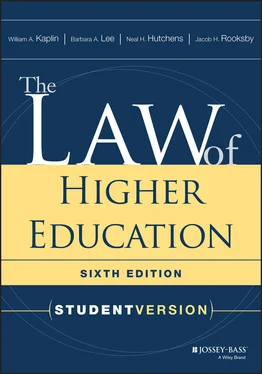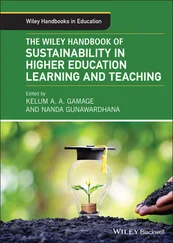A case decided by the U.S. Court of Appeals for the Eighth Circuit illustrates the continuing influence of Bradshaw and Beach and some courts' continuing reluctance to find a special relationship that would create a duty on the college's part to protect students from their own risky behavior. In Freeman v. Busch , 349 F.3d 582 (8th Cir. 2003), a female student was sexually assaulted after consuming alcohol at a private party in a college dorm room. She sought to hold the college and the resident advisor liable for negligence because the resident advisor, who had been told that she was intoxicated and unconscious, did nothing to assist her. The court refused to find that a college has a “custodial duty” to protect an adult college student, and affirmed the trial court's summary judgment ruling for the college and the resident advisor.
Additional sources of liability may arise in states where case or statutory law establishes civil liability for private hosts who furnish intoxicating beverages (see Kelly v. Gwinnell , 476 A.2d 1219 (N.J. 1984), and Bauer v. Dann , 428 N.W.2d 658 (Iowa 1988)) or for retail establishments that sell alcohol to minors. Sponsors of parties at which intoxicants are served, particularly to minors, could be found negligent under the social host doctrine. A court in such a jurisdiction could rely on this law to impose a legal duty on the institution when alcohol is served at college-sponsored activities. Many states also have Dram Shop Acts, which strictly regulate licensed establishments engaged in the sale of intoxicants and impose civil liability for dispensing intoxicants to an intoxicated patron. A college or university that holds a liquor license, or contracts with a concessionaire who holds one, may wish to enlist the aid of legal counsel to assess its legal obligations as a license holder.
3.2.2.6 Student suicide.According to the U.S. Centers for Disease Control, suicide is the third-leading cause of death in the United States among individuals between the ages of 15 and 24, 2 and it is the second leading cause of death for college students. 3 Data collected in 2015–16 indicated that an increasing number of students have considered or attempted suicide. 4
Several high-profile lawsuits, some of which have been resolved against institutions of higher education, make it clear that faculty and administrators must take this issue very seriously, become educated about the warning signs of a potential suicide, and ensure that proper actions are taken if a student exhibits those signs (see, e.g., Andrew Casler, “Cornell student bridge-suicide lawsuit settled,” Ithaca Journal , Sept. 11, 2014, available at http://www.ithacajournal.com/story/news/local/2014/09/11/cornell-student-suicide-lawsuit-settled/15442299/). Although courts in the past refused to create a duty to prevent suicide, holding that it was the act of the suicide victim that was the proximate cause of the death, more recently courts are beginning to find, under certain circumstances, a duty to prevent the suicide or a duty to warn appropriate individuals that a student is a suicide risk.
In a series of lawsuits concerning the potential liability of a college or university for the suicide of a student, plaintiffs have attempted to persuade courts to find a “duty to warn” parents or others of potential dangers to students or a “special relationship” that requires the college to prevent the harm. In Jain v. State of Iowa , 617 N.W.2d 293 (Iowa 2000), the state supreme court rejected the claims of the parents of a student who committed suicide that a “special relationship” between the university and the student required the university to notify the parents of a student's “destructive” behavior. Unlike the outcome of the Tarasoff case (discussed in Section 4.4.2.2), the Iowa court ruled that the failure of university staff to warn the student's parents did not increase the risk of his committing suicide; university staff had encouraged him to seek counseling and had asked him for permission to contact his parents, which he had refused.
More recently, however, courts have found that, under certain circumstances, there may be a duty to take “affirmative action” to prevent a student from harming himself. In Schieszler v. Ferrum College , 236 F. Supp. 2d 602 (W.D. Va. 2002), the aunt of a college student, Michael Frentzel, sued the college, the dean of student affairs, and a resident assistant for wrongful death after the student committed suicide by hanging himself. Frentzel had a history of disciplinary problems during his freshman year, and the college had required him to enroll in anger management counseling. After completing the counseling, Frentzel had an argument with his girlfriend, and the campus police and Frentzel's resident assistant were called. At the same time, Frentzel sent the girlfriend a note indicating that he planned to hang himself. The campus police and resident assistant were shown the note. Frentzel wrote several notes over the next few days, but the police and residence hall advisor took no action, except to forbid the girlfriend to see Frentzel. Frentzel hanged himself three days after the initial altercation.
The plaintiff claimed that a special relationship existed between Frentzel and the college that created a duty to protect him from harm about which the college had knowledge. The defendants asked the court to dismiss the claim, stating that there was no duty to prevent Frentzel from harming himself. The court concluded that, because college employees knew of Frentzel's threats to kill himself, the self-inflicted injuries, and his history of emotional problems, the plaintiff had alleged sufficient facts to support a claim that a special relationship existed, which created a duty to protect Frentzel from “the foreseeable danger that he would hurt himself.” The court also ruled that the plaintiff had alleged sufficient facts to support her claim that the defendants breached their duty to Frentzel. Although the court dismissed the claim against the resident assistant, it ruled that a wrongful death action could be maintained against the college and the dean. The college later settled the case.
A trial court in Massachusetts ruled in 2005 that a special relationship could exist between a student and university staff in a case in which staff knew a student to be suicidal ( Shin v. Massachusetts Institute of Technology , No. 020403 (Mass. Cmmw. June 27, 2005)), and thus denied the university's motion for summary judgment on several of the claims. The case ended in a settlement with no ruling on the merits (“Agreement Reached by MIT and the Shin Family,” http://news.mit.edu/2006/lawsuit-statement). In 2018, the Supreme Judicial Court of Massachusetts, in Nguyen v. Massachusetts Institute of Technology et al ., 96 N.E.3d 128 (Mass. 2018), ruled that, although there is no general duty to prevent another person from committing suicide, under certain circumstances a special relationship may be created that imposes “affirmative duties of reasonable care in regard to the duty to rescue, including the duty to prevent suicide” (96 N.E.3d at 139). In some cases, according to that court, a university would have a special relationship with a suicidal student that would compel the university to take affirmative action to prevent the student from self-harm.
In Nguyen , a 25-year-old graduate student at MIT with a history of mental health problems and two prior suicide attempts committed suicide after being criticized by a faculty advisor. The student had not advised his professors of his previous suicide attempts and had told all of his mental health providers that he was not contemplating suicide. He insisted that his academic difficulties were related to test anxiety and insomnia and, although he told his professors that he was seeing a mental health provider, he refused to allow anyone at MIT to obtain information about his treatment or mental health challenges. After the student's suicide, the student's father sued MIT and two of the professors who had been advising the student on academic matters, accusing them of negligence for failing to prevent his son's death. A trial court awarded summary judgment to the defendants—MIT and the student's professors—(2012 Mass. Super. LEXIS 146 (Mass. Super. April 30, 2012)) and the father appealed.
Читать дальше












